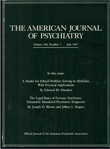Families of borderline patients: literal-minded parents, borderline parents, and parental protectiveness
Abstract
While borderline personality disorder is a well-established psychiatric diagnosis, less is known about family functioning and interactional patterns in subjects with the disorder. The authors describe interactional patterns in families of borderline children where one parent has a severe personality disorder and the other fails to protect the child adequately against the effects of that psychopathology. Two types of parents are described: the literal-minded parent and the borderline parent. The literal-minded parent resembles an alexithymic patient, lacking the ability to empathically understand and respond to the child's feelings and needs. The borderline parent uses the child as the target of projections and reality distortions. Therapy should mobilize the active protective functions of the healthier parent.
Access content
To read the fulltext, please use one of the options below to sign in or purchase access.- Personal login
- Institutional Login
- Sign in via OpenAthens
- Register for access
-
Please login/register if you wish to pair your device and check access availability.
Not a subscriber?
PsychiatryOnline subscription options offer access to the DSM-5 library, books, journals, CME, and patient resources. This all-in-one virtual library provides psychiatrists and mental health professionals with key resources for diagnosis, treatment, research, and professional development.
Need more help? PsychiatryOnline Customer Service may be reached by emailing [email protected] or by calling 800-368-5777 (in the U.S.) or 703-907-7322 (outside the U.S.).



